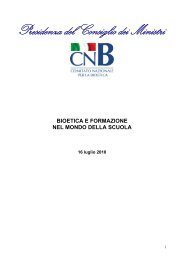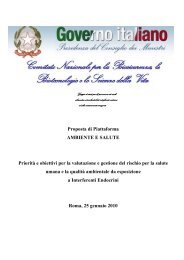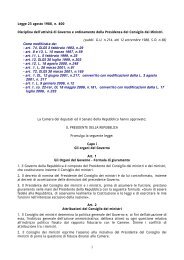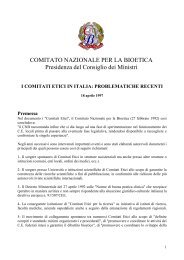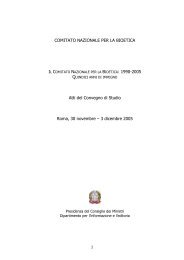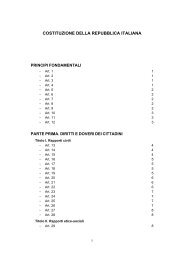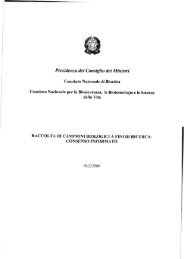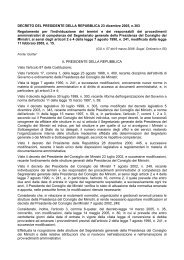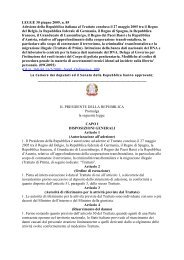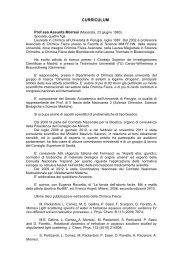President
President
President
Create successful ePaper yourself
Turn your PDF publications into a flip-book with our unique Google optimized e-Paper software.
and non-human life in the age of science and technology is also confronted<br />
with the problems of a society deeply marked by ethical pluralism. Similarly, the<br />
environmental dimension of bioethics, which also places before us certain<br />
evidence (the link between respect and care for non-human life and the<br />
protection of life and the quality of life of all human beings, as well as that of<br />
future generations), and inescapable responsibilities, is in fact, matter for<br />
interpretation, discussion and conflict as regards the manner and timing of<br />
responsible action. Several issues remain open: the link between individual and<br />
collective responsibility, the interaction of responsibilities between single states,<br />
the equitable sharing of responsibilities between developed and developing<br />
countries. Bioethics which moves in the specific context of health care is faced<br />
with the challenging comparison between the imperatives of traditional medical<br />
ethics and the expansion of the means and purposes of medicine: an<br />
expansion that has problematic reflections on the concept of life and health.<br />
In the context of environmental bioethics as in the context of clinical<br />
bioethics, scientific data is not only a piece of data, but it is considered for the<br />
ethical problems it poses, for its being “for” or “against” man: an examination<br />
which takes place through discussion, the comparison of all those involved and<br />
which assumes that everyone has fundamental knowledge of scientific<br />
problems and basic formation in critical reflection on moral principles and<br />
values. Bioethics education is the synthesis of these two elements: a basic<br />
knowledge of the scientific problem and a basic education in ethical reflection.<br />
2. Bioethics Education and International Organizations: statements<br />
of principle<br />
The importance of widespread education in bioethics to all States and at<br />
all levels is reiterated in the major official documents of UNESCO. Take among<br />
others, the Universal Declaration on the Human Genome and Human Rights<br />
(1997) 304 ; the International Declaration on Human Genetic Data (2003) 305 ; the<br />
Universal Declaration on Bioethics and Human Rights (2005).<br />
304 Cf. in particular: Point F. , Promotion of the principles set out in the Declaration, Article 20:<br />
“States should take appropriate measures to promote the principles set out in the Declaration,<br />
through education and relevant means, inter alia through the conduct of research and training<br />
in interdisciplinary fields and through the promotion of education in bioethics, at all levels, in<br />
particular for those responsible for science policies”; Point G, Implementation of the<br />
Declaration, Article 23: “States should take appropriate measures to promote, through<br />
education, training and information dissemination, respect for the above-mentioned principles<br />
and to foster their recognition and effective application. States should also encourage<br />
exchanges and networks among independent ethics Committees, as they are established, to<br />
foster full collaboration”.<br />
305 Cf. Point F, Promotion and implementation, Article 23, Implementation (a): “States should<br />
take all appropriate measures, whether of a legislative, administrative or other character, to<br />
give effect to the principles set out in this Declaration, in accordance with the international law<br />
of human rights. Such measures should be supported by action in the sphere of education,<br />
training and public information”. (b): “In the framework of international cooperation, States<br />
should endeavour to enter into bilateral and multilateral agreements enabling developing<br />
countries to build up their capacity to participate in generating and sharing scientific knowledge<br />
concerning human genetic data and the related know-how”. Article 24, Ethics education,<br />
training and information: “In order to promote the principles set out in this Declaration, States<br />
should endeavour to foster all forms of ethics education and training at all levels as well as to<br />
encourage information and knowledge dissemination programmes about human genetic data.<br />
These measures should aim at specific audiences, in particular researchers and members of<br />
264




